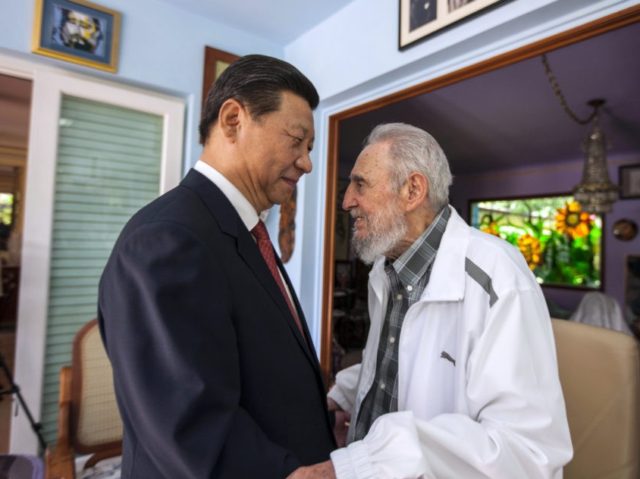The government of China reportedly became Cuba’s largest trading partner last week after signing multiple million-dollar agreements with the fellow communist nation.
China’s dominance of the Cuban economy buys it an alliance with one of America’s closest neighbors at a time that its investments in fellow socialist nations like Venezuela have become major strategic liabilities. It also, as the Cuban-American site Babalú Blog notes, lends the Castro regime a much-needed lifeline in the face of the Trump administration’s moves to contain profits that benefit the repressive dictatorship.
The PanAm Post first noticed the major shift in Cuba’s economy, granting China greater leverage than close neighbors like Venezuela. In a series of agreements last week, China agreed to donate $1 million to Hurricane Irma relief and another $12 million “in supplies, including generators, water pumps, purifiers, folding beds and other resources.” In addition to the free money, China expanded its credit line to Cuba, granting it money to expand energy projects, particularly investment in the “Che” Guevara Electronic Company, according to leftist outlet TeleSur. The PanAm post cites Cuban media for providing the details.
China’s state-run China Daily also reported on the deals—”five cooperation and legal agreements, which reaffirm the willingness of both nations to strengthen and expand their economic and trade relations,” it noted.
“The accords are aimed at supporting the process of recovery of the damages caused by Hurricane Irma. China was one of the first nations to express its condolences and willingness to help,” Rodrigo Malmierca, Cuban Minister of Foreign Trade and Investment, told reporters after signing the deals.
The PanAm post notes that this deal “means that China has officially become the island’s largest trading partner. Chinese-made buses, trucks and cars already frequent Cuban roads.”
Later that week, the Cuban state newspaper Granma boasted of a forum hosted by Havana to allow for networking between Chinese media outlets and those of other Latin American countries. “Media representatives from different Latin American countries and some of the most important communication platforms from the Asian giant shared experiences regarding the perception that exists regarding Sino-Latin American relations and the way to bring reporter closer to reality,” Granma claimed. Both China and Cuba brutally repress independent media and rely on an extensive network of propaganda outlets to disseminate pro-government messages.
Granma also congratulated China on the culmination of the Chinese Communist Party (CPC) Congress last week, in which Xi Jinping became the third man—after Mao Zedong and Deng Xiaoping—to have his name enshrined in the Party’s constitution.
China may be looking to invest more heavily in Cuba after the precipitous decline of the Venezuelan economy, into which China invested significantly. Venezuela is a socialist dictatorship closely allied to the Chinese Communists but, by virtue of imposing socialist economic policies, has seen its economy deteriorate from Latin America’s wealthiest to its most impoverished. In August, the Chinese Global Times media outlet began to warn Chinese businessmen to stay away from the socialist dictatorship, as investing there “is at the cost of great risk.” China remains, as of this summer, Venezuela’s largest creditor.
In addition to investing in the United States’ most vocal enemies in the Americas, China has extended billions in credit to the nations of Africa. While present as a creditor throughout the continent, China has most notably established a military base in Djibouti, west of Yemen, and invested so heavily in Kenya that, by 2015, Kenyans viewed China as the biggest threat to its economy.
“We have watched the activities and actions of others in the region, particularly China, and the financing mechanisms it brings to many of these countries, which result in saddling them with enormous levels of debt,” American Secretary of State Rex Tillerson explained during a talk this month on global economics. “Financing is structured in a way that makes it very difficult for them to obtain future financing, and often has very subtle triggers in the financing that results in financing default, and the conversion of debt into equity.”
While Chinese officials protested Tillerson’s allegations, the Trump administration has vowed to confront China’s global economic policies. President Donald Trump is scheduled to visit China on November 8-10.

COMMENTS
Please let us know if you're having issues with commenting.